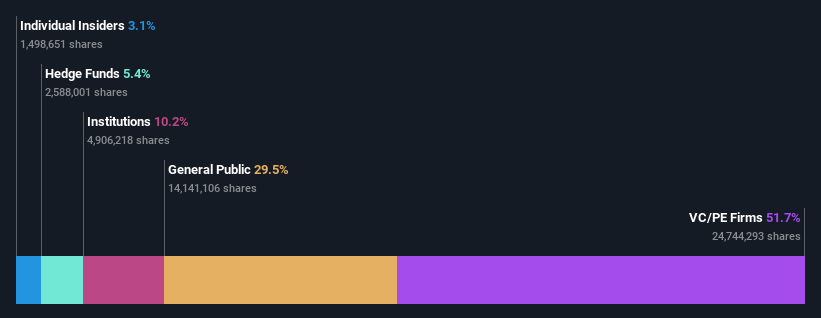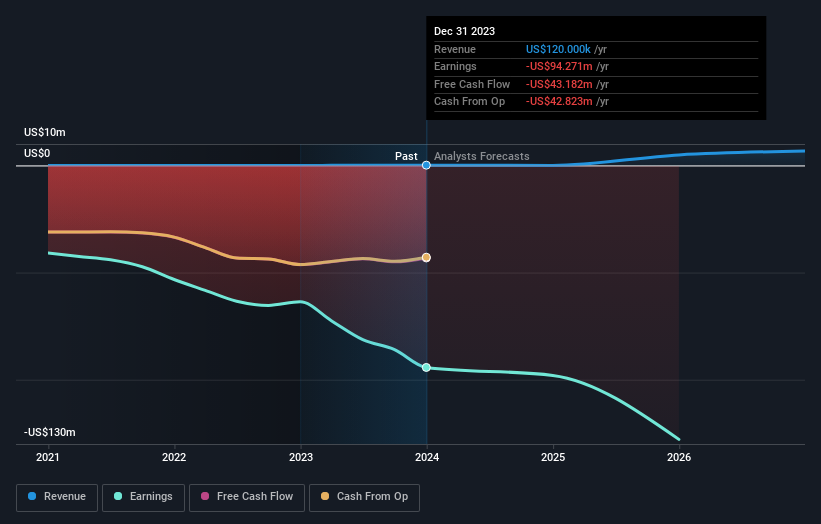Fractyl Health, Inc.'s (NASDAQ:GUTS) largest shareholders are private equity firms with 52% ownership, individual investors own 30%
Key Insights
The considerable ownership by private equity firms in Fractyl Health indicates that they collectively have a greater say in management and business strategy
52% of the business is held by the top 5 shareholders
Every investor in Fractyl Health, Inc. (NASDAQ:GUTS) should be aware of the most powerful shareholder groups. We can see that private equity firms own the lion's share in the company with 52% ownership. That is, the group stands to benefit the most if the stock rises (or lose the most if there is a downturn).
Meanwhile, individual investors make up 30% of the company’s shareholders.
Let's delve deeper into each type of owner of Fractyl Health, beginning with the chart below.
Check out our latest analysis for Fractyl Health
What Does The Institutional Ownership Tell Us About Fractyl Health?
Institutional investors commonly compare their own returns to the returns of a commonly followed index. So they generally do consider buying larger companies that are included in the relevant benchmark index.
We can see that Fractyl Health does have institutional investors; and they hold a good portion of the company's stock. This can indicate that the company has a certain degree of credibility in the investment community. However, it is best to be wary of relying on the supposed validation that comes with institutional investors. They too, get it wrong sometimes. When multiple institutions own a stock, there's always a risk that they are in a 'crowded trade'. When such a trade goes wrong, multiple parties may compete to sell stock fast. This risk is higher in a company without a history of growth. You can see Fractyl Health's historic earnings and revenue below, but keep in mind there's always more to the story.
It would appear that 5.4% of Fractyl Health shares are controlled by hedge funds. That's interesting, because hedge funds can be quite active and activist. Many look for medium term catalysts that will drive the share price higher. Mithril Capital Management LLC is currently the largest shareholder, with 13% of shares outstanding. For context, the second largest shareholder holds about 10% of the shares outstanding, followed by an ownership of 10.0% by the third-largest shareholder. Additionally, the company's CEO Harith Rajagopalan directly holds 2.0% of the total shares outstanding.
On looking further, we found that 52% of the shares are owned by the top 5 shareholders. In other words, these shareholders have a meaningful say in the decisions of the company.
While it makes sense to study institutional ownership data for a company, it also makes sense to study analyst sentiments to know which way the wind is blowing. There are a reasonable number of analysts covering the stock, so it might be useful to find out their aggregate view on the future.
Insider Ownership Of Fractyl Health
The definition of an insider can differ slightly between different countries, but members of the board of directors always count. Management ultimately answers to the board. However, it is not uncommon for managers to be executive board members, especially if they are a founder or the CEO.
Most consider insider ownership a positive because it can indicate the board is well aligned with other shareholders. However, on some occasions too much power is concentrated within this group.
We can see that insiders own shares in Fractyl Health, Inc.. As individuals, the insiders collectively own US$10m worth of the US$321m company. It is good to see some investment by insiders, but it might be worth checking if those insiders have been buying.
General Public Ownership
The general public-- including retail investors -- own 30% stake in the company, and hence can't easily be ignored. While this size of ownership may not be enough to sway a policy decision in their favour, they can still make a collective impact on company policies.
Private Equity Ownership
With a stake of 52%, private equity firms could influence the Fractyl Health board. Sometimes we see private equity stick around for the long term, but generally speaking they have a shorter investment horizon and -- as the name suggests -- don't invest in public companies much. After some time they may look to sell and redeploy capital elsewhere.
Next Steps:
It's always worth thinking about the different groups who own shares in a company. But to understand Fractyl Health better, we need to consider many other factors. For instance, we've identified 6 warning signs for Fractyl Health (4 are a bit concerning) that you should be aware of.
If you are like me, you may want to think about whether this company will grow or shrink. Luckily, you can check this free report showing analyst forecasts for its future.
NB: Figures in this article are calculated using data from the last twelve months, which refer to the 12-month period ending on the last date of the month the financial statement is dated. This may not be consistent with full year annual report figures.
Have feedback on this article? Concerned about the content? Get in touch with us directly. Alternatively, email editorial-team (at) simplywallst.com.
This article by Simply Wall St is general in nature. We provide commentary based on historical data and analyst forecasts only using an unbiased methodology and our articles are not intended to be financial advice. It does not constitute a recommendation to buy or sell any stock, and does not take account of your objectives, or your financial situation. We aim to bring you long-term focused analysis driven by fundamental data. Note that our analysis may not factor in the latest price-sensitive company announcements or qualitative material. Simply Wall St has no position in any stocks mentioned.


